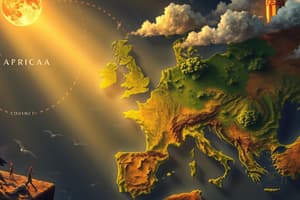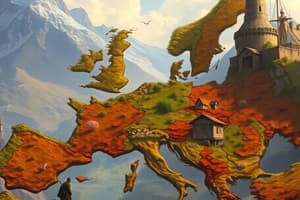Podcast
Questions and Answers
Which countries are part of the United Kingdom?
Which countries are part of the United Kingdom?
- France, Germany, Spain, Portugal
- Ireland, Scotland, Wales, Norway
- England, Wales, Scotland, Northern Ireland (correct)
- USA, Canada, Mexico, Greenland
Which physical feature separates England from the rest of Europe?
Which physical feature separates England from the rest of Europe?
- The Atlantic Ocean
- The North Sea
- The Mediterranean Sea
- The English Channel (correct)
What is a major city in France?
What is a major city in France?
- Luxembourg City
- Paris (correct)
- Amsterdam
- Brussels
Which countries constitute the Benelux region?
Which countries constitute the Benelux region?
Which of the following bodies of water is found around the United Kingdom?
Which of the following bodies of water is found around the United Kingdom?
What was the main cause of the Reformation?
What was the main cause of the Reformation?
What did John Locke imply about the role of governments?
What did John Locke imply about the role of governments?
What sparked European exploration during the modern times?
What sparked European exploration during the modern times?
Which event is related to the movement of goods, people, diseases, and ideas between continents?
Which event is related to the movement of goods, people, diseases, and ideas between continents?
Which item was NOT part of the Columbian Exchange?
Which item was NOT part of the Columbian Exchange?
Flashcards
United Kingdom countries
United Kingdom countries
England, Wales, Scotland, and Northern Ireland make up the United Kingdom.
English Channel
English Channel
A narrow waterway separating England from continental Europe.
Major French city
Major French city
Paris is a major city in France.
Benelux countries
Benelux countries
Signup and view all the flashcards
Atlantic Ocean
Atlantic Ocean
Signup and view all the flashcards
North Sea
North Sea
Signup and view all the flashcards
The Reformation
The Reformation
Signup and view all the flashcards
Martin Luther
Martin Luther
Signup and view all the flashcards
Enlightenment
Enlightenment
Signup and view all the flashcards
John Locke
John Locke
Signup and view all the flashcards
Columbian Exchange
Columbian Exchange
Signup and view all the flashcards
Christopher Columbus
Christopher Columbus
Signup and view all the flashcards
European Exploration
European Exploration
Signup and view all the flashcards
American and French Revolutions
American and French Revolutions
Signup and view all the flashcards
Study Notes
Europe Overview
- Europe is a continent encompassing diverse countries, cultures, histories, and economies.
- It boasts a high standard of living, with an average life expectancy of 81 years.
- The average GDP per capita is approximately $42,000.
- Literacy rates average around 99%.
- Many European countries are democratic.
- Europe is home to over 150 different languages.
Geographic Features
- The English Channel separates England from a large portion of Europe.
- The Atlantic Ocean and the Mediterranean Sea are vital for trade.
- The Baltic Sea is a significant waterway for Nordic countries.
- The Danube River facilitates trade in the Alpine region.
- The Alps are a major mountain range in parts of Europe.
- The Strait of Gibraltar connects the Atlantic Ocean to the Mediterranean Sea.
- The Adriatic Sea is a body of water.
History
- Classical Greece saw the development of democracy in Athens.
- Alexander the Great conquered much of the ancient world, spreading Greek culture.
- The Roman Empire controlled vast territories in Europe, North Africa, and Western Asia, and had a system of representative democracy, which included the Twelve Tables of laws.
- The Medieval period saw a rise in Christianity and the power of the Roman Catholic Church, as well as events like the Crusades.
- The Renaissance brought renewed interest in arts, sciences, and education, facilitated by the printing press.
- The Industrial Revolution began in Great Britain, transforming economies. It also produced global rivalries.
- The 20th century faced World Wars, global economic crises, and genocide like the Holocaust.
Cultures
- European cultures have diverse languages, including Russian, German, French, and English.
- Christianity is a major religion in Europe, stemming from the Roman Catholic Church.
- European countries have experienced significant immigration, leading to cultural diversity.
- Famous European artists include Leonardo da Vinci, Michelangelo, and Pablo Picasso.
- European literature includes iconic works such as those by William Shakespeare.
- Europe has a rich musical tradition, including classical composers like Mozart and bands like The Beatles.
- Popular sports in Europe include soccer (football), rugby, and skiing.
Politics
- Most European countries are democratic.
- Vatican City is a theocracy, governed by the Pope.
- The EU facilitates peace and democracy across the continent.
- European citizens have rights like freedom of religion and speech.
- Citizens have responsibilities including paying taxes, respecting laws, and being informed voters.
- Historically, some European countries have had dictators or monarchs with absolute power.
Economy
- Many European countries have capitalist free-enterprise economies.
- Service industries, agriculture, and manufacturing play major roles.
- Tourism is a significant aspect of the European economy.
- The use of the Euro as a common currency facilitates trade.
Studying That Suits You
Use AI to generate personalized quizzes and flashcards to suit your learning preferences.




